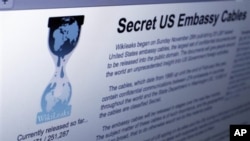The activist Internet websiteWikiLeaks continues to post secret U.S. State Department documents, even as it comes under attacks from opponents, and newspapers partnering with the group continue to publish them. Analysts see the gradual release of the leaked documents as part of WikiLeaks' strategy to keep the story alive in the media. WikiLeaks is also portraying itself as a news organization.
This is the third time thatWikiLeaks has released secret government documents. But in the first two instances, which related to the wars in Afghanistan and Iraq, WikiLeaks released government documents all at once. Now it is following a different strategy.
Only a fraction of the reported 250,000 documents in the organization's possession has been released and published - less than one percent. In an online session last week on the website of the Guardian , a British newspaper that is collaborating with the group,WikiLeaks founder Julian Assange said that his website posts documents after they have first been published by what he called "mainstream media partners."
Former Washington Post managing editor Phil Bennett, who now teaches journalism at Duke University, says Assange is parceling the documents out because he was dissatisfied that stories about the previous documents fell from public attention relatively quickly.
"He was unhappy about the way those stayed in the news and wanted 'more bang for the buck' [more attention over a longer period of time]," said Bennett. "And I think there's no doubt that they're parceling out the information in a way to keep the story alive and sustain interest in it."
This piecemeal release of classified cables has troubled U.S. officials.
Former CIA deputy director John McLaughlin says officials do not like surprises, and they are getting new ones every day.
"The fact that this is dribbling out, if you're in government now you have to wonder, 'What's next, and what am I going to have to cope with?' And it's likely to come at a bad time when you already have your hands full," said McLaughlin. "So it's another volatile factor in a world that's already too volatile."
The arrangement between WikiLeaks and the news organizations publishing the material - Le Monde in France, El Pais in Spain, the Guardian in Britain, and Der Spiegel in Germany - is unusual. It links media organizations to a group that is under what U.S. Attorney General Eric Holder calls "active, ongoing, serious investigation."
But the newspapers are not publishing every document, focusing on what they consider interesting. One document, for example, listing infrastructure sites around the world that the United States views as critical was posted byWikiLeaks , but not by the media outlets.
Julian Assange says he is acting as a journalist and thatWikiLeaks is a journalistic institution. In a posting this week on the website CommonDreams, Assange said thatWikiLeaks has invented a new type of reporting that he calls "scientific journalism" in which people can read a news story, then click online to see its veracity.
But journalist Phil Bennett saysWikiLeaks has been secretive, which makes Assange's claim of journalistic status difficult to justify.
"There's not a lot of transparency to how these documents are being handled," he said. "And that is part of the problem in assessing what kind of organizationWikiLeaks is, what intent it has, and whether or not it's applying real journalistic standards to assessing, to verifying, and to discussing how to publish this information."
It is unclear how long the daily release of U.S. embassy cables will continue.
News
Analysts: WikiLeaks Following New Strategy in Document Release
- By Gary Thomas









